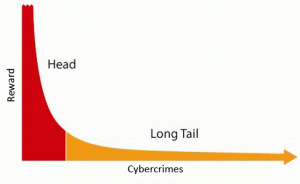Archive for the ‘Long tail of crime’ tag
The Criminology and Economic incentives behind Cybercrimes no comments
The prevailing assumption of cybercrime is that it is a massive threat that could cause unimaginable chaos to society. However, this is just a virtual threat. The reality is that cybercrimes most often involve small impact bulk victimisations which can be individually insignificant but collectively significant. Most cybercriminals target the long tail of crime where they prefer to commit more crimes with less gain. An example of that would be a cybercriminal scamming 50 million people for £1.

Such a model of crime has several advantages over traditional models of crime as individually insignificant amount of losses means:
1. Victims would be less bothered about reporting the crime
2. Police less likely to get involved
3. Credit card companies less bothered
For more information, please see the presentation on “Organized Crime and the Organization of Cybercrime” given by David Wall.
The study of cybercrime requires a multidisciplinary approach as the society is affected. Economics, law, sociology, psychology and criminology are just some of the disciplines involved. It is my intention to understand cybercrimes from the economics and criminology perspective so that I can have a better understanding on why cybercrimes occur.
Economics
After reading the presentation on “How Economics and Information Security Affects Cyber Crime and What This Means in the Context of a Global Recession” given by Peter Guerra, I believe that by understanding more about the economic incentives behind cybercrime, that is, the incentives to commit crime and the incentives to protect from crime, I would gain a better understanding of the rationale behind cybercrimes and whether critical points can be identified using economic theories.
The economic books which I’m proposing to read are:
- Microeconomics: Principles and analysis by F.A. Cowell
- Economics (6th Ed) by J. Sloman
Criminology
Criminology is the study of crimes and by studying criminology, I’m looking to develop an understanding on the theories in criminology and an imaginative mind on crimes so that not only I can understand why crimes occur but can also anticipate when and where crime is likely to occur. There are three textbooks I’ve found which are relevant:
- Criminology: The Basics by Sandra Walklate
- The Oxford Handbook of Criminology by Mike Maguire, Rod Morgan, and Robert Reiner
- Cybercrime: The Transformation of Crime in the Information Age by David S. Wall
- Handbook of Internet Crime by Yvonne Jewkes and Majid Yar